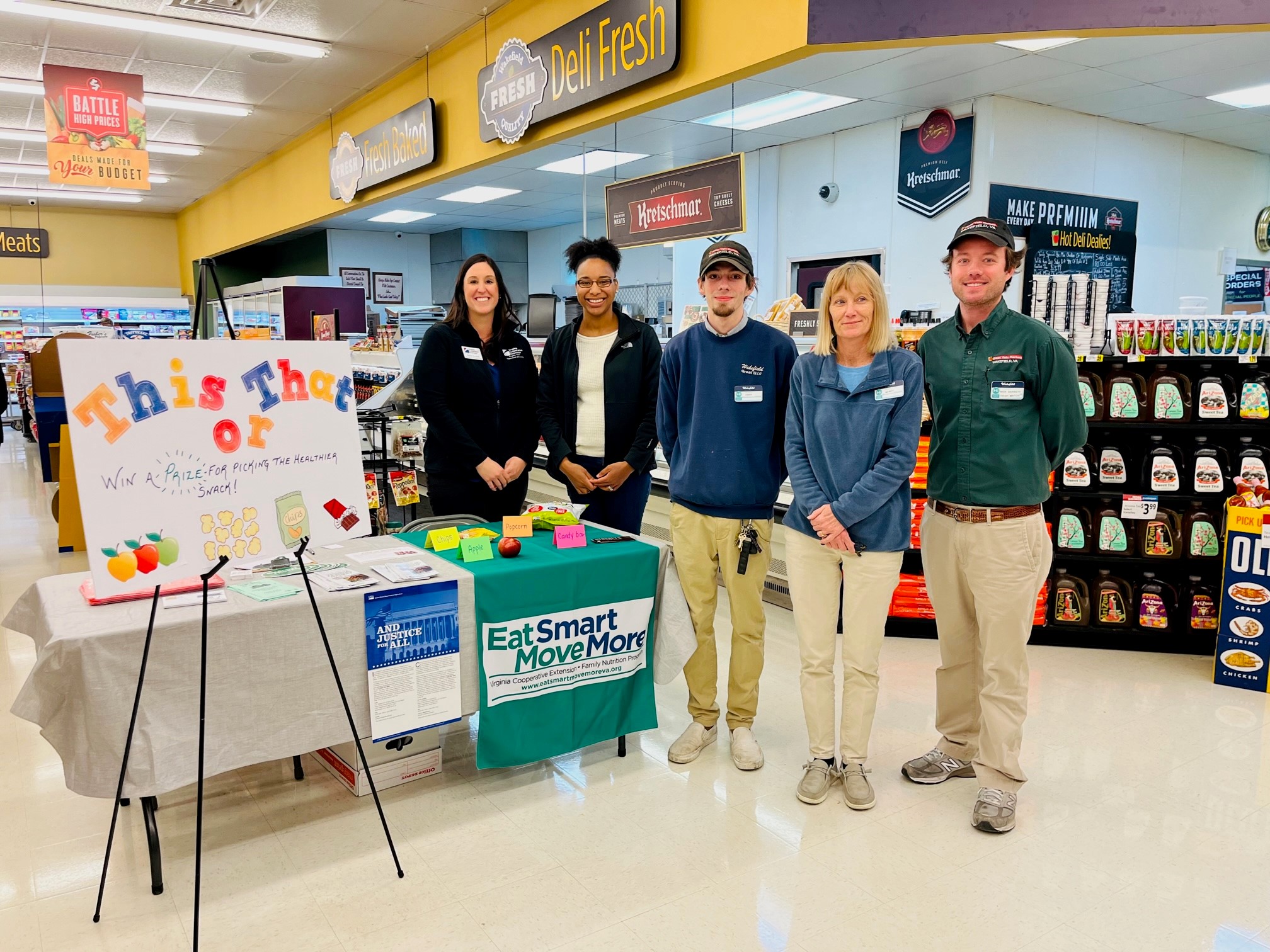Making way through the clatter of shopping carts and the rush of the automatic doors at Wakefield Market, a line of people at the deli counter are waiting patiently for lunch. The layered sounds of the cash registers float over top of the pyramids of freshly-picked cabbages. Everything is green for St. Patrick’s Day and soon the changing seasons will bring many more types of locally grown fruits and vegetables.
The market is a happening place. Purveyor Nick Garrett gladly greets an agent from the Virginia Cooperative Extension, Kelsey Kennedy, as she sets up a booth for the Eat Smart. Move More. Initiative. Parents clutching the hands of toddlers explore the healthy snacks. Efficient grannies glide by, inspecting the news about the upcoming Farmers Markets.
A Critical Neighborhood Resource
As the only full-service grocery store in Surry and Sussex counties, Wakefield Market serves far more than one purpose. Staff are trained as long-term employees, customers are well-considered with delivery options and online ordering, and thoughtful innovation is apparent across all aspects of operations. Transportation for the elderly is considered. Local farmers are considered. The community itself is considered in all decisions.
The spirit of the independent grocer is alive and well in Mr. Garrett. The sensibilities and virtues of a small town require that everyone looks out for everyone else. Relationships are tight-knit and therefore interests are too. As community leadership is passed from one generation to the next, as is the case for Wakefield Market, the challenging strands of the present must be interwoven with the prospects of the future.
The challenges of the present are at all sides. Almost 20% of the surrounding population lives at or below poverty level. The nearest big box store is over 30 minutes away, but its location does not deter money from being redirected outside of the community. Access to fresh foods is a major issue for families in the region, as is the ability to provide nutritional meals on a budget.
Resourcing the Mission
Recognizing the market’s significance and potential, Mr. Garrett connected with the Virginia Food Access Investment Fund (VFAIF) within the Department of Agriculture and Consumer Services. As a partner of the VFAIF, Locus provided technical assistance and then deployed the resources of the Virginia Fresh Food Loan Fund (VFFLF). The fund is supported by Healthy Food Finance Initiative grants of the CDFI Fund within the US Dept. of Treasury.
Needing to update environmentally outdated refrigeration equipment, Wakefield Market took advantage of the loan fund’s credit enhancement tools. Locus subsidized the rate on both loans to offer a below market rate using the balance of their buydown funds. These infrastructure changes enabled Wakefield to expand its healthy food inventory. The benefits were compounded by the nutrition incentives the store began offering which provided a 50% discount on all fresh produce for customers making purchases with their EBT cards.
The collaboration between Wakefield Market and the Food System Financing team at Locus resulted in four major outcomes:
- Increased food access in rural Virginia,
- Increased SNAP and Virginia Fresh Match participation,
- A creative capital stack, including a $50,000 VFAIF grant, and
- Trust built between stakeholders: Wakefield Market, customers, Locus, and state government.
Along the way, partnerships were created among the County’s municipal leadership, the Industrial Development Authority, and area community foundations to explore how their respective resources might further leverage the store’s investment in increasing healthy food access in their rural region, which continues to be a shared goal among all partners.
More Than Meals
This project addressed four of the five Social Determinants of Health: economic stability, healthcare quality, neighborhood and environment, and community context. Locus seeks to build the capacity of underserved communities by supporting community organization, entrepreneurial skills, and access to fragmented resources. The thoughtful and creative collaboration of this project will serve as a framework for future opportunities to expand access to fresh foods across the Commonwealth and beyond.
Let’s do more, together.
There are many ways to partner with VCC Social Enterprises on the road toward equity. Are you our next visionary collaborator?

